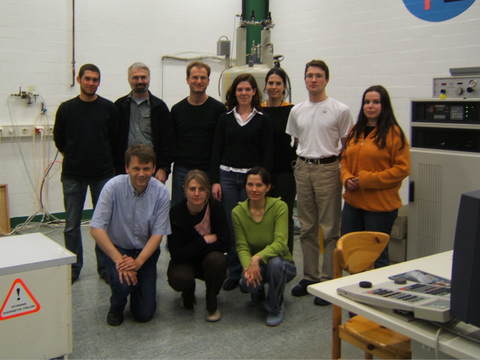Report of the 5. DMG Shortcourse "Applications of Solid State NMR Spectroscopy in the mineralogical and geoscientific research "
in Bochum from 17. - 20. May 2005

Under the initiative and guidance of PD Dr. Michael Fechtelkord, the workshop of NMR spectroscopy took place at the Institute for Geology, Mineralogy and Geophysics at the Ruhr University in Bochum from 17-20th May.
The topic of solid state NMR attracted a group of about 10 people of different nationalities, from different universities (Hamburg, Innsbruck, and Bochum), federal research centres (BAM and GFZ Berlin), and even from the industry (PCI Augsburg). Amongst the participants were physicists, chemists, pharmacists, crystallographers and mineralogists.
The starting lecture - a theoretical introduction to the method and its history - was followed by the more extensive basics of 1H spin-lattice relaxation and an experimental demonstration.
That afternoon, first experiments were carried out by the participants: Temperature dependent measurements of tetramethylammoniumiodide. From that data the activation energy of some molecular-dynamic processes could be obtained. Later on, the first social event – the icebreaker party - took place, with a lot of interesting interdisciplinary talk.
On the second day basics of magnetic dipolar interactions, of the chemical shift, as well as the routine technique of magic angle spinning (MAS) were presented. In practice, data were collected on minerals containing 29Si, 19F and 1H.
Practical evaluation of the obtained spectra was done using the WinFit software. Starting with basic examples (Lorentzian and Gaussian line shapes) we moved on to more complex cases including anisotropy of chemical shift for static and also MAS data.
The third day was dedicated to more sophisticated methods, such as cross-polarization experiments and the INADEQUATE (Incredible natural abundance double quantum transfer experiment) experiment. After a long afternoon interpreting the data from this day experiments, the course was continued at the “Summa cum laude”, were Michael Fechtelkord has proven that he is also a very skilled lecturer at the “Kegelbahn”. The results of the “skittles-ball-spin-experiments” were ranging from “inadequate” to “magic”.
The third day started with the theoretical basics of quadrupolar interactions of first and second order. Furthermore, most recent methodical developments in solid state NMR spectroscopy were presented: Rotational echo double resonance (REDOR), satellite transition spectroscopy (SATRAS), double rotation (DOR) and Multi-Quantum magic angle spinning (MQMAS). The data - obtained in the accompanying experiments (23Na MAS NMR and 27Al MAS NMR SATRAS) – was evaluated in the afternoon.
The main objectives of the workshop were reached: To give an introduction to the routine NMR techniques, as well as the latest developments in this method. Applications were demonstrated with many interesting examples. Beyond the topic of this course the exchange between scientists and institutions was support.
Biljana Lazic and Hannes Krüger,
Innsbruck


